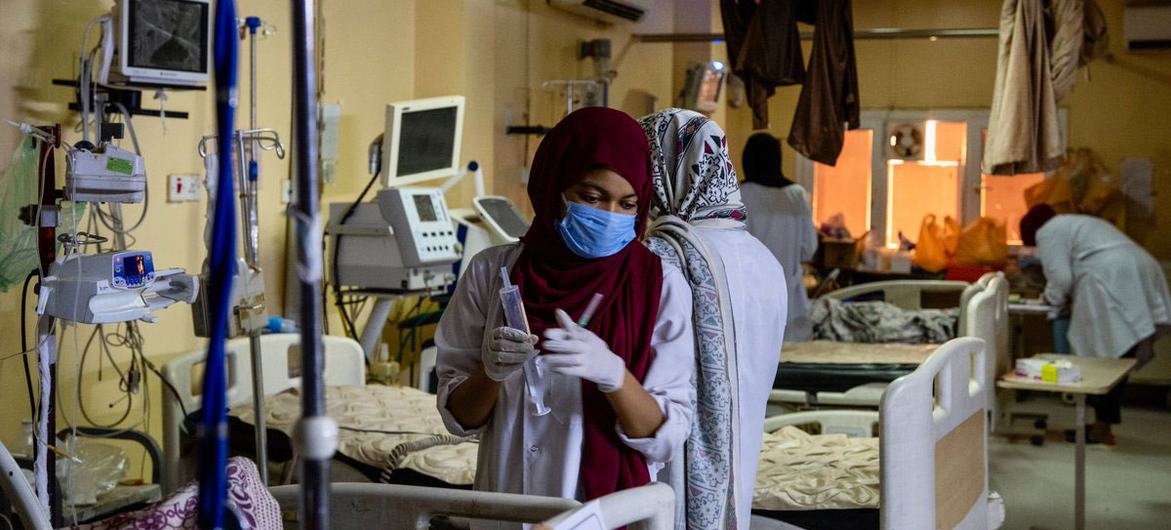
World Health Organization: Sudans health system has reached a breaking point
moatinoon
The World Health Organization (WHO) has stated that Sudans health system has reached a breaking point due to the immense pressure on healthcare facilities and their reduced capacity to meet the growing needs resulting from disease outbreaks and malnutrition.
Dr. Nama Saeed Abed, WHO Representative in Sudan, explained at the periodic press conference of the United Nations agencies in Geneva on Tuesday that access to healthcare remains limited due to insecurity, displacement, lack of medications, and medical supplies, exposing millions of Sudanese to the risk of serious diseases or preventable and treatable deaths.
In an update on the health situation in Sudan, which is experiencing widespread disease outbreaks, restrictions on access to healthcare, and attacks on healthcare facilities, Abed stated that the majority of health facilities in conflict hotspots have ceased to function. Facilities in areas not directly affected by the conflict are suffering from patient overcrowding. He also added that healthcare workers have not received their salaries for nearly seven months.
He expressed regret for the continued attacks on healthcare facilities, noting that WHO has verified 60 attacks on healthcare facilities since the beginning of the conflict, which have resulted in 34 deaths and 38 injuries, further impacting the availability of care.
He also pointed out that the mass displacement following the conflict has resulted in widespread malnutrition, putting childrens lives at risk. Cholera, measles, dengue fever, and malaria are spreading in several states. Combining any of these diseases with malnutrition can be fatal.
Dr. Abed warned that cholera is spreading rapidly due to favorable conditions, including unsafe water, poor sanitation, displacement, and weak healthcare services.
According to WHO, cholera outbreaks have now been declared in three states across Sudan: Al-Qadarif, Khartoum, and South Kordofan, with suspected cases reported in Al-Jazirah and Kassala states.
As of last week, around 1,000 suspected cholera cases and approximately 72 cholera-related deaths have been reported. Estimates suggest that over 3.1 million people are at risk of contracting cholera by the end of December 2023.
Dr. Nama Saeed Abed said that the Federal Ministry of Health launched a multi-sectoral response to the cholera outbreak with the participation of all health partners, including WHO.
WHO stated that it has stockpiled medications and essential supplies for treating cholera patients and fully supports several cholera treatment centers and units in Al-Qadarif and Al-Jazirah states with supplies, operational costs, fuel, and staff.
The organization is also training rapid response teams and covering their deployment costs in affected areas, enhancing surveillance through training and operational support, and training doctors and nurses on cholera case management, infection prevention, and control.
The organization noted that it is facilitating the shipment of samples to the Public Health Laboratory in Port Sudan, which has been updated with equipment, supplies, and training to serve as a national reference laboratory, replacing the National Public Health Laboratory in Khartoum, which has been occupied since the conflict began.
The samples include cholera, measles, dengue fever, and polio, and have been sent by road to the Ministry of Healths laboratories in Cairo. WHO is coordinating with partners to enhance water, sanitation, and hygiene services, which are the backbone of cholera prevention and response.
WHO is also involved in monitoring water quality in water sources in localities, and UNICEF is providing water treatment supplies. Additionally, the organization is working with local communities to raise awareness of the risks and implement necessary measures to prevent further cholera spread, such as treating drinking water.
The ongoing conflict in Sudan for seven months has had devastating effects on peoples lives, health, and well-being throughout the country, causing 5.9 million people to flee their homes, with more than 1.2 million of them seeking refuge in neighboring countries, in addition to 3 million internally displaced people before the current conflict, making Sudan the worlds largest internally displaced persons crisis.

